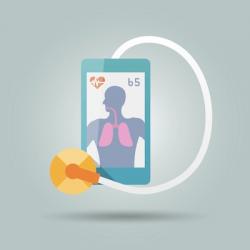 Imagine you’re a 30-year-old who eats healthily, exercises regularly, doesn’t use tobacco products or drink excessive amounts of alcohol, and has an unremarkable family medical history.
Imagine you’re a 30-year-old who eats healthily, exercises regularly, doesn’t use tobacco products or drink excessive amounts of alcohol, and has an unremarkable family medical history.
 Imagine you’re a 30-year-old who eats healthily, exercises regularly, doesn’t use tobacco products or drink excessive amounts of alcohol, and has an unremarkable family medical history. You visit your regular physician for an annual checkup, and after a quick 15-minute chat with your doctor he schedules you for blood work and says to come back in two or three years unless the blood panel shows a problem or an illness appears. You likely don’t feel well cared for or very informed, do you?
Imagine you’re a 30-year-old who eats healthily, exercises regularly, doesn’t use tobacco products or drink excessive amounts of alcohol, and has an unremarkable family medical history. You visit your regular physician for an annual checkup, and after a quick 15-minute chat with your doctor he schedules you for blood work and says to come back in two or three years unless the blood panel shows a problem or an illness appears. You likely don’t feel well cared for or very informed, do you?
You’re not alone in feeling that way. Any good nutritionist, trainer or counselor knows that preventive health care can’t adequately be done in one 15-minute session per year, yet this scenario has been the standard of physician-patient interaction for decades and has caused growing disconnect among doctors and their patients. But technology is narrowing that gap. The idea of “modern medicine” is being revolutionized thanks to unprecedented amounts of data flowing from mobile health care devices (mHealth). Soon the concept of quick annual checkups will become obsolete, and doctors are going to be more frequently involved in their patients’ lives in inventive and intimate ways—resulting in a new era of understanding about disease management and prevention.
One of the biggest changes the health care industry faces is the increase of consumer available tests and data, which means people are becoming familiar with the kinds of things physicians look at during annual visits and more preventative tests can be done from home, says Dr. William Rusnak, a family medicine resident in Philadelphia.
This greater access means patients won’t need to visit the clinic for routine testing.
“My hope is that an annual check-up turns into more a quarterly checkup, and that can be a reality if the convenience is available,” Rusnak says. “Obviously people aren’t going to take off time from work and schedule an appointment physically see a physician that often, so I see this happening in terms of mHealth.”
More frequent patient-physician interactions for at-risk patients can increase the likelihood of detecting early signs of cancer, chronic lower respiratory diseases, heart disease, strokes, diabetes and Alzheimer’s, which are among the leading causes of deaths for Americans. The current method of screening for these ailments every few years leaves patients vulnerable to missing red flags and putting them behind the curve on preventative care, Rusnak says. And although home health monitoring is off to a slow start, mHealth tools are increasing in popularity and providing medical teams with new resources to manage and prevent these illnesses—resources which will eventually curb the contraction and mortality growth rates.
Politics, financial costs and shady data security methods means telemedicine and mHealth in their current form won’t entirely replace physical checkups, but digital visits are already transforming the type of health care patients receive — soon seeing your doctor only once every year or three will phase out completely.
Getting useful, consumer-friendly medical devices into the hands of patients and having physicians engaging with patients who use those tools is the first step. But this change is going to be a result of examining the types of data and information coming in from mobile health systems, which are providing way more information than researchers have ever had before and delivering insights to the ways diseases progress and the optimal ways to manage them, says Euan Thomson, the CEO of AliveCor, a mobile echocardiogram manufacturer and heart disease research company.
“The nature of the way that we understand and track diseases is going to change significantly. That’s one of the main drivers [of mHealth], because data is going to give us better care and better insights than ever before,” Thomson says. “Not just through the logistics of telemedicine, but through a greater understanding of the disease process itself.”
This data is going to allow for more specialized care, and offer patients improved understanding of their chronic illness and how to manage it. In upcoming years, when patients establish care at a medical practice they’re going to be working with entire teams, and depending on their individual needs they will spend more or less time with particular members of the team. For example, a diabetic needs more medical, dietary, and even podiatry care than a healthy teenager who likely requires more emotional counseling, personal development coaching, and fitness guidance. Medicine is going to become much more individualized, and that personalization is going to increase exponentially as more convenient, reliable mHealth devices enter the marketplace.
But the replacement of irregular checkups goes further than wearing personal health care devices and having doctors use the results. The expansion that is going to happen the most because of these new telemedicine technologies is in rural areas where doctors will be able to do consulting from a health care center to a physician’s office, monitor chronic diseases, and more slowly for psychiatric and therapeutic sessions, says Dr. Janis Orlowski, the chief health care officer at the Association of American Medical Colleges.
“Telemedicine has really been the promise for the last 10 or 15 years that has really never quite met its greatest potential, and I think that’s because it was limited by technology, but those limitations are slowly falling away,” she says.
However, despite the proposed benefits of telemedicine and mobile health care various organizations, like the American Medical Association, urge caution when physicians begin implementing mobile devices into their treatment plan.
The AMA recommends doctors establish a physician-patient relationship prior to any telemedicine interaction taking place, with certain exemptions for specialties like pathology, radiology and urgent care situations where a face-to-face interaction is not fundamental in the standard of care. Physicians need to see their patients face-to-face in order to gather the background information necessary to make educated health care decisions and provide good care. Once that initial relationship is established, the AMA recommends that physicians use any mode of technology they choose so long as the technology allows them to meet the standard of care for whatever service they are providing.
Unlike Rusnak and Thomson, the AMA doesn’t foresee regular physician exams completely disappearing, but they’ll take on a different role than what’s currently practiced. The organization argues annual visits will become a critical summary between the patient and physician, where additional background information about the patient’s health over the course of the year is provided. This gives the patient quantifiable data and goals for the upcoming year.
mhealth / shutterstock






